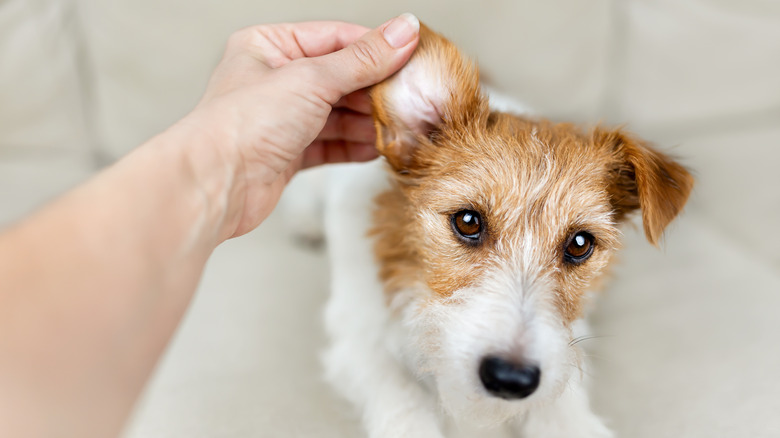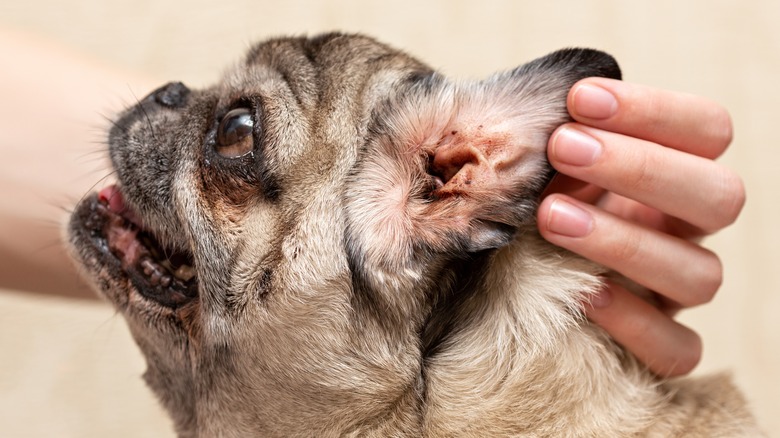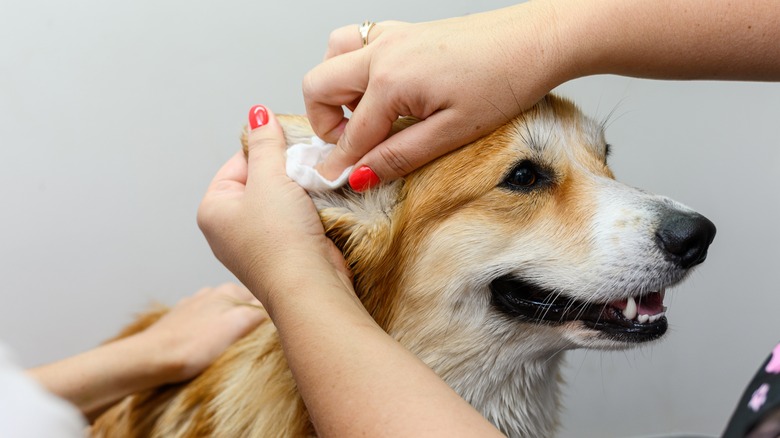How Often Should You Clean Your Dog's Ears? Parents Of Water-Loving Pups Will Want To Pay Attention
Hello? Can you hear me? Unless you regularly clean your dog's ears, they may not be able to! Okay, that may be a bit of an exaggeration, but when it comes to dog grooming, the ears are often overlooked, and there are lots of reasons they shouldn't be, especially if you have a pup who loves to splash and play in the water.
As for how often you should clean your dog's ears, that's going to depend on your specific canine pal. Dogs with really hairy or floppy ears or a history of ear infections will probably need more regular cleaning than others. And just like humans, some dogs are simply more prone to ear debris and infection. When your pup's ears get wet after swimming or a bath, a thorough cleaning is recommended, according to Cornell's Richard P. Riney Canine Health Center. So, if you and your bud love running on the beach or jumping into pools, ear cleaning sessions should be a regular part of your routine.
Otherwise, you really only have to clean your dog's ears when you notice they're dirty. For some pups, that might be once every couple of weeks. For others, it might be several times a week. It just depends on your dog. But you really want to make sure not to overclean their ears because it could lead to irritation and cause problems where there weren't any before.
The risks of not cleaning your dog's ears
If you forget to clean your pup's ears and accidentally let dirt and gunk build up, it could easily lead to ear infections in certain dogs. If your dog has an ear infection and dirty ears, their antibiotic treatment may not be able to reach the actual infection, instead getting lost in the grime. When a pup's ears aren't thoroughly cleaned during and after treatment for an infection, re-infection could occur, and that's a vicious cycle you don't want to get caught in.
Per the American Kennel Club (AKC), symptoms of ear infections include head shaking, redness, swelling, discharge, itchiness, or crusting and scabs. Some inner ear infections can have lasting consequences, such as deafness and facial paralysis, so it's extremely important to get an antibiotic from your vet when you notice an infection and keep your pup's ears clean during and after treatment.
Dogs who love the water are at a particularly high risk for ear infections since moisture can be a cause. Think about it: Floppy, long ear canals with lots of nooks and crannies are perfect breeding grounds for excess water and dirt, which can lead to a build-up of bacteria. It's true: Dogs can actually get swimmer's ear! Swimmer's ear is "inflammation of the outer ear canal," as described by veterinarian Dr. Amelia G. White at Veterinary Partner. Like with other infections, Dr. White says, swimmer's ear can occur "when water contaminated with bacteria is trapped in the ear canal for a long period of time." That's why it's so important to get any water out of your pup's ears after a trip to the beach or the lake.
How to clean your dog's ears
Per the AKC, there are really only three things you need to clean your dog's ears: some cotton swabs, an ear-cleaning solution made specifically for dogs, and a clean towel. Don't use Q-tips or anything with a sharp, pointy tip. (You're not even supposed to use those on human ears!) You're going to want to squeeze the ear solution into your dog's ear canal and massage it for about 30 seconds. Some dogs will tolerate this really well, but others may shake and get antsy, so definitely do this in a bathroom or another area that can be easily cleaned.
After massaging the area, let your pup shake its head, then use your towel to dry its face, your face, and anything that gets sprayed. Next, wipe out the ear canal with a cotton swab. It's very important not to go too deep; don't go farther than one knuckle in. Don't be afraid to reward your pup with praise and treats throughout the process!


